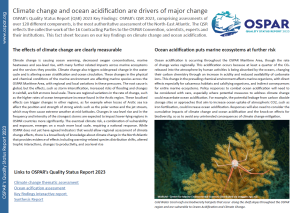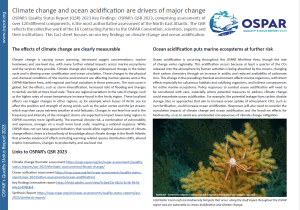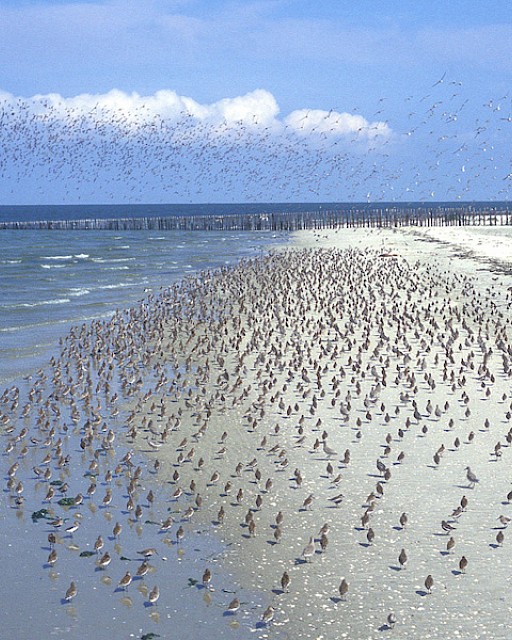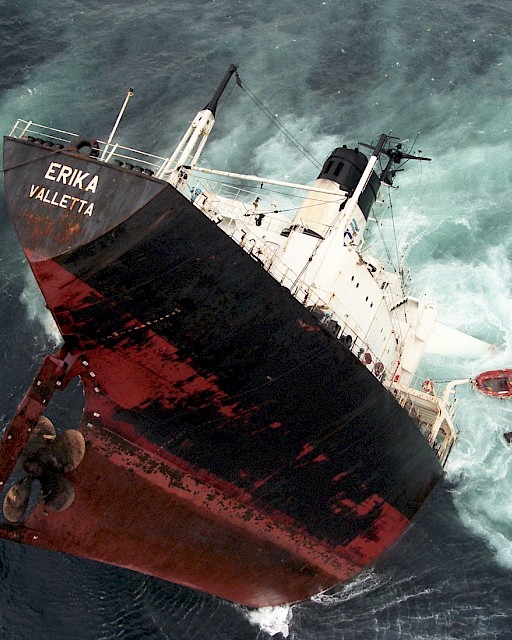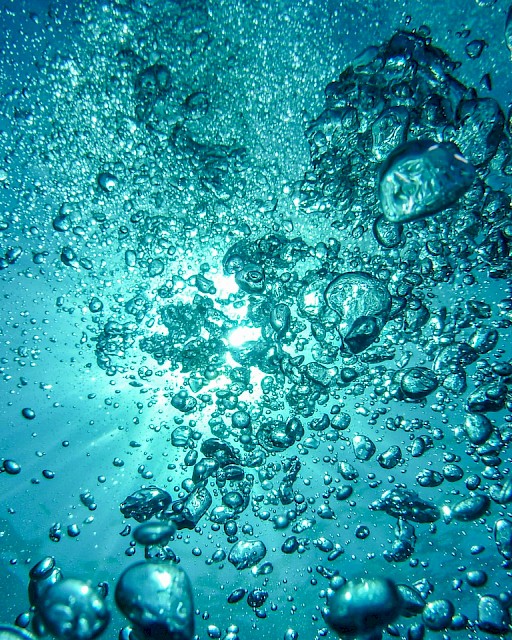The ocean is critical in regulating the Earth’s climate: it has absorbed 89% of the excess heat trapped inside the atmosphere since the 1970s, and every year absorbs at least a quarter of the carbon dioxide (CO2) released by human activities.
Their ability to absorb heat and CO2 means that marine ecosystems, and the human activities within them, are particularly vulnerable to climate change. Rising sea level and temperatures, reduced pH values, changes in rainfall amounts and reduced sea ice coverage, among others, are all effects of the rising atmospheric greenhouse gas concentrations. The impacts of climate change and ocean acidification as well as the need for adaptation, resilience and mitigation in all aspects of OSPAR’s work is of great importance, and is therefore deeply embedded in the 2030 North-East Atlantic Environment Strategy (NEAES 2030).
In 2023 COCOA produced a fact sheet on climate change and ocean acidificaiton in the North-East Atlantic.
Working Group on Changing Ocean Climate and Ocean Acidification (WG COCOA)
To acknowledge the urgency of this issue, in 2023 OSPAR established a Working Group on Changing Ocean Climate and Ocean Acidification (WG COCOA). The WG works with the remit to facilitate the implementation of Strategic Objectives in the NEAES 2030 concerning ocean acidification and climate change, and to ensure the integration of climate change and ocean acidification throughout the OSPAR structure.
The group will work in accordance with its Terms of Reference.
In 2022 OSPAR became an affiliate member of the Ocean Acidification Alliance.

Key findings QSR 2023 (Synthesis report)
For delivering the OSPAR’s Quality Status Report 2023 a climate change expert group (CCEG) was established in 2021, convened by United Kingdom, to produce the climate change thematic assessment.
The Intersessional Correspondence Group on ocean acidification (ICG-OA), co-convened by Ireland and the Netherlands, worked to produce OSPAR's first ever assessment on ocean acidification for OSPAR's Quality Status Report 2023.
Briefing note on climate change
NEAES 2030 Strategic Objectives
The scope of work of WG COCOA aims to advance OSPAR’s work on climate change and ocean acidification, specifically but not limited to:
- Monitoring and assessment;
- Adaptation and resilience;
- Response and mitigation;
- Awareness-raising and communication.
The Working Group will consider both current and future climate change and ocean acidification.
Resilience to the impacts of climate change and ocean acidification is one of the four themes encompassed by NEAES 2030. This theme has three strategic objectives:
- OSPAR will raise awareness of climate change and ocean acidification by monitoring, analysing and communicating their effects (Strategic Objective 10);
- OSPAR will facilitate adaptation to the impacts of climate change and ocean acidification by considering additional pressures when developing programmes, actions and measures (Strategic Objective 11); and
- OSPAR will mitigate climate change and ocean acidification by contributing to global efforts, including by safeguarding the marine environment’s role as a natural carbon store (Strategic Objective 12).
WG COCOA will also give support the delivery of the climate change and ocean acidification-related aspects of other Strategic Objectives as well as ensure the integration of climate change and ocean acidification throughout the OSPAR structure.
Key findings Climate change
The effects of climate change are clearly measurable
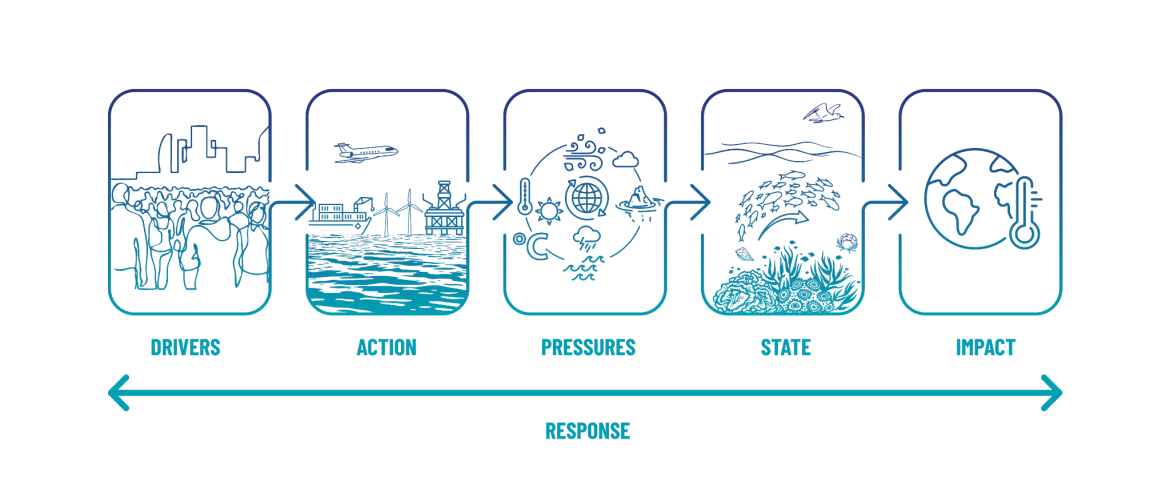
- Climate change is causing ocean warming, decreased oxygen concentrations, marine heatwaves and sea-level rise, with many further related impacts across marine ecosystems and the services they provide.
- Climate change also triggers widespread change in the water cycle and is altering ocean stratification and ocean circulation.
- Climate change effects include warming-related species distribution shifts, altered trophic interactions, changes to productivity, and sea level rise
- Climate change is affecting marine species across the OSPAR Maritime Area, with regional and local variations in these pressures.
- higher rates of ocean temperature increase found in the Arctic region.
- localised effects can trigger changes in other regions, as for example when losses of Arctic sea ice affect the position and strength of strong winds such as the polar vortex and the jet stream, which may then cause extreme weather at mid-latitudes.
- Changes in sea-level rise and in the frequency and intensity of the strongest storms are expected to impact lower-lying regions in OSPAR countries more significantly.
- The eventual climate risk, a combination of vulnerability and exposure, emerges on a much more local scale, requiring a national response.
Key findings Ocean Acidification
Ocean acidification puts marine ecosystems at further risk
- Ocean acidification is occurring throughout the OSPAR Maritime Area, though the rate of change varies regionally.
- This change in the prevailing chemical environment affects marine organisms, with direct effects especially for calcareous habitats and calcifying organisms, and indirect consequences for entire marine ecosystems.
- Policy responses to combat ocean acidification will need to be considered with care, especially where potential measures to address climate change could exacerbate ocean acidification. For example, the potential leakage from carbon dioxide storage sites or approaches that aim to increase ocean uptake of atmospheric CO2, such as iron fertilisation, could increase ocean acidification.
- Responses will also need to consider the cumulative impacts of climate change and ocean acidification and the knock-on effects for biodiversity, so as to avoid any unintended consequences of climate change mitigation.
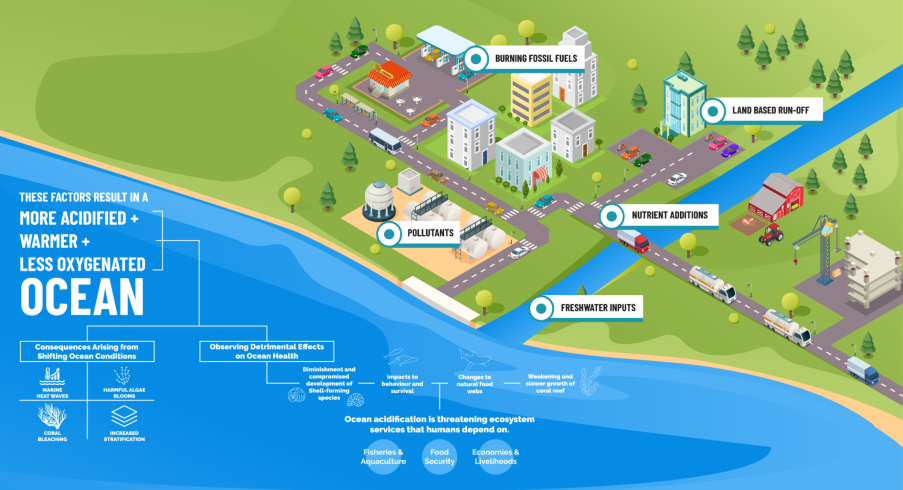
Joint OSPAR/ICES study group on ocean acidification (SGOA)
OSPAR works with partner organisations such as the International Council for Exploration of the Sea (ICES), the Intergovernmental Oceanographic Commission (IOC) and the Arctic Council to enhance the knowledge on these issues. The Joint OSPAR/ICES Study Group on Ocean Acidification (SGOA) was formed in 2012, chaired by Evin McGovern (Ireland) and Mark Benfield (USA). In total 33 scientists representing 12 countries participated in SGOA.
Final Report to OSPAR of the Joint OSPAR/ICES Ocean Acidification Study Group (SGOA)

